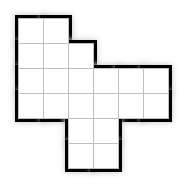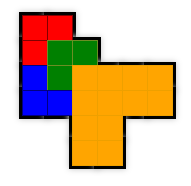

It was a wet Sunday afternoon and I was in a dissecting mood. Using different colours I split each of the outlines below into 2 similar shapes.
Your challenge is to work out how I did it (click the help tab above for more).





|
1
✓
✗
|
|
2
✓
✗
|
|
3
✓
✗
|
InstructionsTry your best to answer the questions above. Type your answers into the boxes provided leaving no spaces. As you work through the exercise regularly click the "check" button. If you have any wrong answers, do your best to do corrections but if there is anything you don't understand, please ask your teacher for help. When you have got all of the questions correct you may want to print out this page and paste it into your exercise book. If you keep your work in an ePortfolio you could take a screen shot of your answers and paste that into your Maths file. |
||
|
|
||
|
|

|
More Activities: |
|
Mathematicians are not the people who find Maths easy; they are the people who enjoy how mystifying, puzzling and hard it is. Are you a mathematician? Comment recorded on the 28 September 'Starter of the Day' page by Malcolm P, Dorset: "A set of real life savers!! Comment recorded on the s /Coordinate 'Starter of the Day' page by Greg, Wales: "Excellent resource, I use it all of the time! The only problem is that there is too much good stuff here!!" |
Each month a newsletter is published containing details of the new additions to the Transum website and a new puzzle of the month. The newsletter is then duplicated as a podcast which is available on the major delivery networks. You can listen to the podcast while you are commuting, exercising or relaxing. Transum breaking news is available on Twitter @Transum and if that's not enough there is also a Transum Facebook page. |
|
Numeracy"Numeracy is a proficiency which is developed mainly in Mathematics but also in other subjects. It is more than an ability to do basic arithmetic. It involves developing confidence and competence with numbers and measures. It requires understanding of the number system, a repertoire of mathematical techniques, and an inclination and ability to solve quantitative or spatial problems in a range of contexts. Numeracy also demands understanding of the ways in which data are gathered by counting and measuring, and presented in graphs, diagrams, charts and tables." Secondary National Strategy, Mathematics at key stage 3 |
||
Go MathsLearning and understanding Mathematics, at every level, requires learner engagement. Mathematics is not a spectator sport. Sometimes traditional teaching fails to actively involve students. One way to address the problem is through the use of interactive activities and this web site provides many of those. The Go Maths page is an alphabetical list of free activities designed for students in Secondary/High school. Maths MapAre you looking for something specific? An exercise to supplement the topic you are studying at school at the moment perhaps. Navigate using our Maths Map to find exercises, puzzles and Maths lesson starters grouped by topic. | ||
Teachers | ||
|
If you found this activity useful don't forget to record it in your scheme of work or learning management system. The short URL, ready to be copied and pasted, is as follows: |
Alternatively, if you use Google Classroom, all you have to do is click on the green icon below in order to add this activity to one of your classes. |
It may be worth remembering that if Transum.org should go offline for whatever reason, there is a mirror site at Transum.info that contains most of the resources that are available here on Transum.org. When planning to use technology in your lesson always have a plan B! |
|
Do you have any comments? It is always useful to receive feedback and helps make this free resource even more useful for those learning Mathematics anywhere in the world. Click here to enter your comments. |
||
© Transum Mathematics 1997-2026
Scan the QR code below to visit the online version of this activity.
https://www.Transum.org/go/?Num=984
Close
❎Similar Shapes - A basic similar shapes exercise.
Level 1 - Use the colours to dissect the outlines into 2 Parts
Level 2 - Use the colours to dissect the outlines into 3 Parts
Level 3 - Use the colours to dissect the outlines into 4 Parts
Level 4 - Use the colours to dissect the outlines into 5 Parts
More Shape Activities including lesson Starters, visual aids, investigations and self-marking exercises.
Answers to this exercise are available lower down this page when you are logged in to your Transum account. If you don’t yet have a Transum subscription one can be very quickly set up if you are a teacher, tutor or parent.
See the National Curriculum page for links to related online activities and resources.
Click a paint tin then click a square in one of the outlines to change its colour.
Your objective is to split the area inside the outline into a number of similar shapes. So, for example if this is the outline given:

The similar shapes could be shown using the colours like this:

Notice that each of the coloured shapes are similar (but not all congruent).
For each outline there may be a number of different ways to fill it with similar shapes. You need to find the way I did it to be marked correct. You can have as many different attempts as you want (use the clear button to start again). The colours don't matter, you do not need to choose the same colours as I did. It is just the shapes that need to be correct.
You can learn more about the concept of similar shapes by doing the Similar Shapes exercise.
Answers to this exercise are available lower down this page when you are logged in to your Transum account. If you don’t yet have a Transum subscription one can be very quickly set up if you are a teacher, tutor or parent.
Close
❎